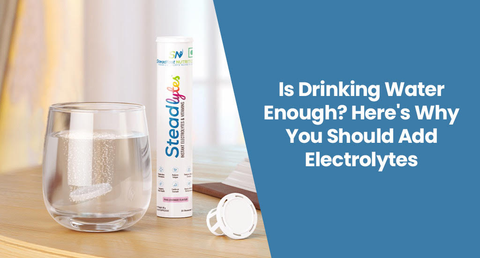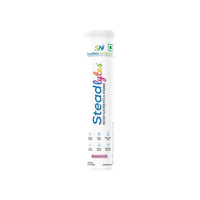Table of Content
Proper hydration is essential for supporting vital processes such as delivering nutrients to cells and maintaining body temperature. Staying hydrated helps protect organs, lubricates joints and flushes out waste products. However, while drinking water is essential, it doesn’t always fully address the body’s electrolyte needs. That’s where water with electrolytes added — minerals like sodium, potassium, calcium, chloride and magnesium — comes in. These minerals are crucial for maintaining body fluid balance, regulating body pH, and supporting nerve and muscle contraction. Every day, we lose water and electrolytes through natural processes like breathing, sweating, and urination. While a balanced diet often provides sufficient electrolytes for most people, there are times, such as during prolonged physical activity, illness, or exposure to extreme heat, when electrolyte levels drop significantly. Without adequate electrolytes, the body struggles to regulate hydration, which can lead to dehydration, muscle cramps, fatigue, and more serious health conditions.
This is why hydration involves more than just drinking water. Pairing water with the right balance of electrolytes helps optimise fluid absorption and retention, ensuring the body remains properly hydrated. For athletes, active individuals, or anyone experiencing rapid electrolyte loss, especially during endurance or intense activities, replenishing these minerals is essential to maintain peak performance and overall well-being.
What are Electrolytes?
Electrolytes are minerals that carry an electric charge when dissolved in water, playing a crucial role in various bodily functions. These include sodium, potassium, calcium, magnesium, chloride, phosphate, and bicarbonate, found in fluids like blood, sweat, and urine.
Functions of Electrolytes:
1. Fluid Balance:
Regulate water movement in and out of cells, ensuring hydration.
2. Muscle Function:
Enable muscle contraction and relaxation, vital for physical activity.
3. Nerve Function:
Help facilitate the transfer of electrical impulses between nerve cells.
4. Acid-Base Balance:
Maintain the body’s pH levels within a healthy range.
5. Energy Conversion:
Aid in converting nutrients into usable energy.
Importance of Electrolyte Balance:
Electrolytes are essential for cardiovascular, muscular, and neurological systems. Loss of electrolytes through sweat, urine, or illness can lead to imbalances, causing fatigue, cramps, dehydration, or severe health issues.
Sources of Electrolytes:
Electrolytes are usually obtained from food and beverages including bananas, green leafy vegetables, cheese, nuts and seeds, with beverages like lemon water, coconut water & juices being most readily consumed for quickly replenishing lost electrolytes. Athletes and active individuals often require replenishment during intense activity to support hydration and performance. Maintaining a proper electrolyte balance ensures the body functions efficiently.
An electrolyte supplement like Steadlytes is one of the prime ways to fulfil daily electrolyte needs. Steadfast Nutrition’s Steadlytes is a comprehensive electrolyte supplement designed to keep you hydrated and energised. Packed with essential electrolytes like sodium, potassium, magnesium, calcium, and chloride, along with vitamins C and B12, it helps replenish lost electrolytes, prevent muscle cramps, and support bone health. Conveniently available in effervescent tablet form, simply drop one tablet into 200 ml of water. Let it fizz, and enjoy a refreshing hydration drink. Each tube contains 20 tablets, making it a perfect companion for your active lifestyle.
Common Signs You Need Electrolytes:
Electrolytes are essential for proper hydration, muscle function, and overall health. When your body lacks these crucial minerals, it sends clear signals that it’s time to replenish them.
1. Muscle Cramps or Spasms
A common sign of sodium, potassium, or magnesium deficiency.
2. Fatigue and Weakness
Low electrolyte levels can make you feel unusually tired or drained.
3. Dizziness or Lightheadedness
Can occur due to dehydration or low sodium levels.
4. Irregular Heartbeat
Imbalanced sodium, potassium, calcium, or magnesium may affect heart rhythm.
5. Thirst and Dry Mouth
A strong indicator that you may need electrolytes, especially sodium.
6. Mental Confusion or Brain Fog
Low sodium can impair cognitive function.
7. Dark-Coloured Urine or Infrequent Urination
A sign your body is conserving water due to dehydration.
8. Numbness or Tingling
Associated with calcium or potassium deficiency.
Common Causes of Electrolyte Loss:
- Sweating: From exercise or heat exposure.
- Illness: Diarrhoea, vomiting, fever, burns, cancer
- Medications: Excessive use of antibiotics, diuretics & laxatives, chemotherapy
- Poor diet: Eating disorders, unhealthy diet practices
If you experience these symptoms regularly or severely, consider replenishing electrolytes through a balanced diet, hydration solutions, or supplements.
Benefits of Adding Electrolytes to Water
Electrolytes are essential minerals that enhance hydration and support vital body functions. Adding them to water offers several advantages:
1. Enhances Hydration
- Electrolytes like sodium and potassium improve the body’s ability to retain water, reducing the risk of dehydration.
- Helps maintain fluid balance, especially during exercise or in hot weather.
2. Boosts Exercise Performance
- Replenishes minerals lost through sweat, such as sodium, potassium, and magnesium, to sustain energy, strength, and endurance.
- Prevents muscle cramps and fatigue, improves muscle contractions, and reduces soreness.
3. Supports Recovery During Illness
- Rehydrates effectively during vomiting, diarrhoea, or fever by restoring lost fluids and minerals.
- Helps prevent severe dehydration when consumed early during sickness.
4. Prevents Heat-Related Illness
- Maintains body temperature regulation in hot climates, reducing the risk of heat exhaustion or heat stroke because electrolytes help maintain intracellular and extracellular fluids.
5. Improves Cognitive and Nervous System Function
- Helps maintain focus, reaction time, and alertness by transmitting nerve signals and electrical impulses for proper brain functioning.
- Reduces mental fog associated with dehydration.
6. Aids in Maintaining pH and Electrolyte Balance
- Regulates the body's acid-base balance for optimal cellular function.
Adding electrolytes to water ensures better hydration and supports overall health, making it beneficial especially during physical activity, illness, or extreme heat.
How to Incorporate Electrolytes into Your Daily Routine
Maintaining proper hydration and electrolyte balance is essential for overall health, especially with a busy schedule. Here are effective ways to ensure consistent electrolyte intake:
1. Add Sea Salt to Water
- A pinch of sea salt or Himalayan pink salt in water boosts sodium, potassium, calcium, and magnesium levels.
2. Incorporate fresh Fruits and Vegetables
- Citrus fruits (lemon, orange), cucumber, or watermelon can be infused with water for a flavourful, nutrient-rich drink.
- These ingredients are high in potassium, magnesium, and other essential minerals.
3. Drink Coconut Water
- A natural source of potassium, magnesium, and calcium, coconut water can be added to your routine along with water for rehydration & replenishment after intense exercise or taken by individuals in hot climates.
4. Include Ginger in Water
- Infuse water with ginger slices for added calcium, magnesium, sodium, potassium, phosphorous, and immunity-boosting benefits.
5. Consume Electrolyte Powders
- Use electrolyte powders or drinks during workouts or on hot days to quickly replenish lost minerals.
- Start with a few packets weekly and adjust based on your needs.
6. Choose Foods Rich in Electrolytes
- Incorporate potassium-rich foods like bananas, celery, and kale, or enjoy smoothies with almond milk and fruits.
- Eat fresh produce like apples and watermelon for added hydration and minerals.
7. Opt for Natural Beverages
- Drink flavoured or normal milk, fresh juices or have soups as natural electrolyte sources.
- Limit sugary sports drinks unless recovering from intense workouts, sweating, or illness.
8. Time Your Electrolyte Intake
- Drink electrolyte water in the morning or post-exercise to optimise hydration.
By integrating these simple strategies into your routine, you can effectively maintain hydration and support essential bodily functions. Always consult a healthcare provider for personalised advice if considering supplements.
Who Can Benefit Most from Electrolyte Drinks?
- Athletes & Fitness Enthusiasts: Replenishes electrolytes lost through sweat, improving performance and recovery.
- People Living in Hot Climates: Prevents dehydration and heat-related issues from excessive sweating due to hot and humid weather.
- Those with Illness: Helps rehydrate during vomiting, diarrhoea, or fever by managing fluid balance as well as body temperature.
- Older Adults: Supports hydration and nerve function as thirst sensation decreases with age.
- People on restricted diets: Balances lost electrolytes reducing risk of water retention & fluid build-up during restricted diets.
- Hangover Relief: Restores hydration and alleviates symptoms.
Electrolyte drinks are essential for anyone needing quick hydration and mineral replenishment.
Conclusion
While water is essential for hydration, it may not always be enough to maintain optimal electrolyte balance, especially during intense physical activity, illness, or exposure to extreme heat. Adding electrolytes to your routine can help replenish vital minerals like sodium, potassium, magnesium, and calcium, which are lost through sweat and other bodily functions. Incorporating electrolyte-rich foods, beverages, or supplements ensures better hydration, improved performance, and overall well-being. Stay ahead of dehydration by making electrolytes a part of your hydration strategy.


